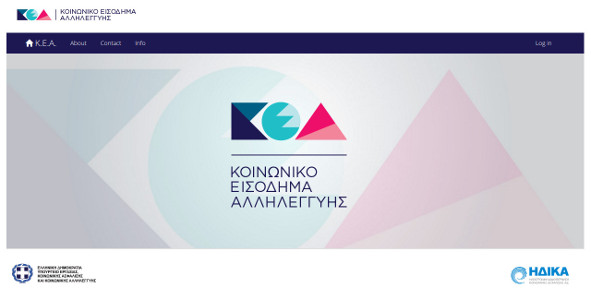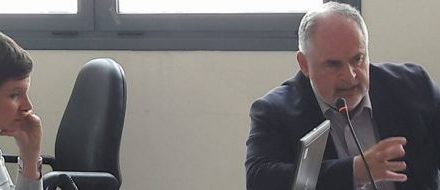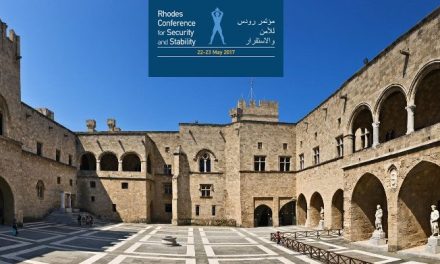The Social Solidarity Income (SSI or KEA from its Greek initials: Κοινωνικό Εισόδημα Αλληλεγγύης) is a welfare programme just launched by the Μinistry of Labor and Social Solidarity and aimed at providing a safety net to households living under extreme poverty. Extreme poverty is defined as income below a certain threshold (for example, 1.200 euro for one person or 2.400 euro for a 4-member family – in total during the previous six months) and assets below a certain value. The program is based on three pillars: a) income support, b) connection with social integration services, and c) connection with activation services aimed towards the integration or reintegration of beneficiaries into the labor market.
In the pilot phase of the program, which started in July and ended in December 2016, 30 municipalities were selected and the SSI was given out to an estimated 48,000 beneficiaries, 50% of which had zero income. The second phase of the program that begins this January, will include 325 municipalities throughout Greece and is doted with a budget of 760 million euro. The project will provide benefits in the form of cash and services to beneficiaries, as well as assistance for the reintegration in working and social life. Some of the social services that can be combined with the cash payments are, indicatively: Free medical care for the uninsured; provision of school meals; referral to social care and support services; inclusion in programs of the Social Poverty Response Structures; inclusion in programs implemented under the Fund for European Aid to the Most Deprived (FEAD); cheaper electricity, water and municipal utilities bills; priority placement in child care centers.
As far as the so-called “activation” services are concerned, they are aimed specifically at the unemployed beneficiaries. In order for the beneficiaries to remain active and not be limited this small amount of economic help, a 10% of unemployed beneficiaries that are able to work, will be included in programs for combating unemployment and other specialized programs. These include, inter alia: community service programs; vocational training programs; acquisition of work experience programs; and for those who have not completed high school, studying in a “second opportunity” school for adults. A big problem that the program is trying to combat is undeclared work, and this is why all unemployed beneficiaries are required to register with OAED (Greek Public Employment Agency), and to visit the Community Centers every month to report on their activities.
The application to be included in the program is a done via the electronic platform https://keaprogram.gr, which is connected electronically to Taxis (the taxation information system), Ergani (the database for all salaried workers), Helios (the integrated system for all benefits and pensions) and is approved or not automatically.
During the programme’s roll out, Community Centers will play a key role. Community Centers will be operate as “one-stop shops” for a wide of social services, in collaboration with the Directorate of Social Services of each municipality. As far the SSI is concerned, the Community Centers will to map the needs of citizens, direct them to the benefits they are entitled to and to network them with businesses that need staff.

A basic social safety net for the most vulnerable
Attempts to introduce similar welfare programmes (Guaranteed Minimum Income – GMI policies) as a basic social safety net for the most vulnerable sectors of society in Greece have been made before. In 2000, the centre-left government led by Pasok assessed and then rejected a proposal in favour of this option. Syriza also tabled a legislative proposal to institute a GMI in 2005, without success. In recent times, the GMI had rarely appeared in policy debates, encountering resistance from many quarters. Some trade unions and left-wing critics see the GMI as a threat to well established social protection mechanisms for unionised workers, pensioners and their families. From the right, a pro-poor agenda struggled to gain any prominence until the recent economic crisis brought about by the austerity measures of previous bailouts.
The previous coalition government, led by the centre-right party New Democracy in alliance with centre-left Pasok, feebly endorsed a GMI and launched a pilot in November 2014, engineered by the World Bank. The pilot was implemented in 13 municipalities across Greece
The adjustment programme, agreed to between Greece and international creditors in August 2015, included plans for a national roll-out of a GMI. The GMI is not an unconditional basic income for all citizens, but would be the first universal means-tested grant that covers all Greeks below a certain level of income and asset ownership, regardless of employment status, job contract type, professional category, gender or age. The final memorandum approved by the Greek parliament provided for a national roll-out of the GMI by end of 2016, financed by 0.5% of GDP.
Many EU countries (e.g. Austria, Belgium, Cyprus, Czech Republic, Germany, Denmark, Finland, Netherlands Portugal, Slovenia and Sweden) have robust GMI programmes. Most programmes combine cash payments as well as payments in kind, such as free medical care in Cyprus. Commonly, each country requires that applicants have a minimum number of years of legal residency in order to benefit.
See also: Greece is the only EU country without guaranteed minimum income, report finds (2014); GREECE: Government to roll out a Guaranteed Minimum Income scheme (2015); Third Economic Adjustment Programme for Greece (2015-6)
TAGS: GOVERNMENT & POLITICS | SOCIAL POLICY














